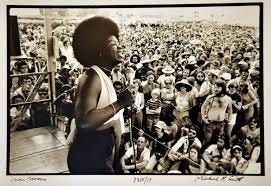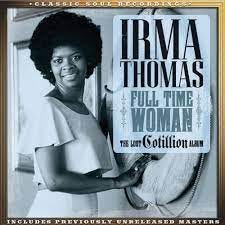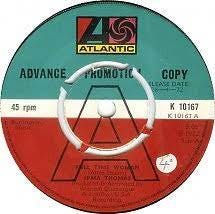Irma Thomas, the somehow still under-appreciated soul singer from New Orleans, first experienced success in the middle 1960s with a string of crisp pop-R&B singles, some produced by Allen Toussaint. Among them were several released on the Minit label, which was later bought by Imperial: “Anyone Who Knows What Love Is (Will Understand),” written by Randy Newman and Jeannie Seely, and the first recording of “Time Is On My Side,” later a hit for the Rolling Stones. (You don’t even have to hear Thomas’ rendition to know how good she was, because you’ve probably already heard it: For the first half of the Stones’ version, Mick Jagger openly imitates Thomas’ vocal phrasing and inflection.)
Though she never stopped performing, Thomas was “rediscovered” in the 1980s, during the period when New Orleans began celebrating its musical legacy with the yearly Jazz and Heritage Festival. Since then, she’s made solid records that showcased the city’s A-list musical talent, and recorded detours that veer slightly from her repertoire of blues and R&B, like My Heart’s In Memphis: The Songs of Dan Penn (2000). Now 81 and still performing, Thomas is the subject of a recent documentary (Irma: My Life In Music) and is, as usual, a featured artist on this spring’s New Orleans Jazz and Heritage festival lineup.
Thomas is one of those artists whose records don’t tell the whole story: She’s been galvanic on stage for decades, a master of timing who redeems ordinary melodies through the sheer intention and urgency in her voice. Songs that, on record, follow familiar generic narrative paths seem to open up and sprout wings when she performs; using slight shrugs and imploring repetitions, she makes listeners care about the closing moments of a romance, while conveying the scope internal devastation.
Of course, that dramatic work starts with songs. Like so many of her contemporaries (think Sarah Vaughan covering “Send in the Clowns” et al.), Thomas has devoted considerable energy to finding material she could not simply sing, but own. The recently reissued Full-Time Woman: The Lost Cotillion Album chronicles one brief sliver of that quest; it gathers work Thomas did in 1971-72 for Atlantic/Cotillion Records, under the direction of Aretha Franklin’s legendary producer Jerry Wexler.
The press release calls The Lost Cotillion Album “a major addition to the Irma Thomas discography,” but it’s not that major — more like a fascinating mixed bag. Thomas was open to changing her approach to fit the industry moment, even if it meant doing comparatively tame pop ballads like the title track, which was produced by noted New Orleans music legend Wardell Quezergue yet has very little New Orleans in it.
Wexler set up sessions in Detroit and Philadelphia (see the polished “Adam and Eve” on the attached playlist). The repertoire for the proposed album, which was unreleased until it surfaced briefly on CD in 2014, includes Thomas’ breathless version of the Bobbie Gentry hit “Fancy” as well as a smoldering 6/8 ballad treatment of the standard “Time After Time.” It’s possible to imagine record executives back then voicing conference-room skepticism about this track – because it’s an old song, because the performance is so emotion-forward. Those are among the reasons it stands out now: It’s a contrast to the other, more workmanlike productions on Full Time Woman, and another example (if any was necessary) of how incandescent Irma Thomas can be when she has a sturdy melody to work with.
Why yes, we have a fancy digital suggestion box. Share your favorite Underloved/Overlooked records here: echolocatormusic@gmail.com.
Please consider subscribing (it’s still free!). And…..please spread the word! (This only works via word of mouth!).







Wow - had no idea Randy Newman and Jeannie Seely wrote a song together!